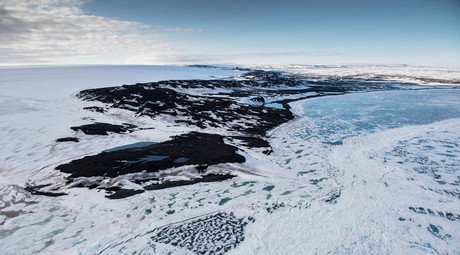‘Potential already there’ for global race to exploit Arctic resources – Kerry
The global race for the Arctic’s riches is already in progress and attracting military interests, according to US State Secretary John Kerry, who says Washington is keeping a close eye on China and Russia and adapting its “national security” strategy.
“Our future national security strategy is going to be affected also by what’s going on in the Arctic. The melting of the polar cap is opening sea lanes that never before existed,” Kerry said in a speech at Old Dominion University.
“The potential there is already there for a global race to exploit the resources of the region,” Kerry stated.
The US, Canada, Iceland, Norway, Sweden, Finland, Russia, and Denmark all have claims to the resource rich region. China has been an observer of the Arctic Council since May 2013, and has no claims to the Arctic, but being a manufacturing powerhouse, Beijing is eager to exploit the Northeastern Passage have access to shorter shipping routes.
“Everybody knows Russia planted a flag on the North Pole bottom. Other countries are up there, China and others, with their ships, mapping out the exploitation of resources, including oil, natural gas, fish,” Kerry said.
#Climatechange is threat now to our national security, global stability. Remarks at @ODUNow: https://t.co/JCfaIAn8Sgpic.twitter.com/LYEdfhRa3U
— John Kerry (@JohnKerry) November 11, 2015Below the ice and cold waters of the Arctic Ocean are hidden vast natural reserves: approximately 20 percent of oil reserves worldwide, about 30 per cent of the planet’s natural gas, there are also believe to be deposits of platinum, gold and tin – just for starters.
Climate change in the Artic is progressing twice as fast as in the rest of the world. As the Arctic ice cap decreases year by year, the regions natural resources and sea routes are becoming more accessible.
Russia is leading the race in claiming the region and has taken active steps to secure its interests. Moscow always stressed the priority of the Arctic in its latest economic and defense programs. Kerry says the US is closely watching Moscow’s activity.
“Economic riches tend to attract military interest as nations seek to ensure their own rights are protected. And we know, because we track it, that these countries – like Russia, China, and others – are active in the Arctic,” said the Secretary of State.
The restoration of Russian military infrastructure in the Arctic began in 2012 with the aim of being completed by 2020. Russia is developing mobile nuclear power plants designated for military installations in the region. It is also adopting military technology to better suit the harsh weather conditions in the polar region. Moscow has almost finished building a new Arctic military base on Kotelny Island, off the eastern Siberian coast. Russian troops will be deployed there, and at a series of smaller Arctic bases and airfields by 2018, equipped with all the necessary high-tech weaponry.
Meanwhile the United States, which “by virtue of Alaska” is also an Arctic nation, does not have the tools to compete with Russia over energy resources in the Arctic, James Carden, executive editor for the American Committee for East-West Accord, told RT.
“We – compared to Russia – are very, very far behind,” Carden said, pointing out that the US is not in the same league to compete with Russia’s massive fleet of icebreakers. “In order for there to be a competition, there has to be equality between the sides.”
On the economic front, major projects include the development of energy resources on the Arctic shelf and works on the Northern Sea Route. In late 2013, Russia began extracting oil from the Arctic shelf. Moscow claims about two-thirds of large oil and gas deposits there, but plans to claim more territory through the so-called Lomonosov Ridge. Russian authorities have promised to lodge claims to the United Nations in 2015.













